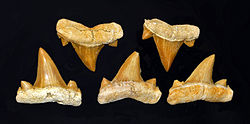Cretolamna
|
Cretolamna Temporal range: Barremian - Miocene |
|
|---|---|
 |
|
| Whole body fossil of Cretolamna | |
 |
|
| Fossil teeth of C. biauriculata from Khouribga (Morocco) | |
| Scientific classification | |
| Kingdom: | Animalia |
| Phylum: | Chordata |
| Class: | Chondrichthyes |
| Subclass: | Elasmobranchii |
| Superorder: | Selachimorpha |
| Order: | Lamniformes |
| Family: | †Cretoxyrhinidae or †Otodontidae |
| Genus: |
†Cretolamna Glikman 1958 |
| Species | |
|
|
Cretolamna is a genus of extinct mackerel shark that belonged to either the family Cretoxyrhinidae or Otodontidae.
These sharks lived from the Barremian of the Cretaceous period to the Mid Miocene epoch, approximately from 130.0 to 13.65 million years ago. It is considered by many to be the ancestor of many of the famous shark genera, such as the mako, great white, Angustidens, and Megalodon sharks.
The genus name Cretolamna means Cretaceous Lamna, as the first specimens of these Lamniformes sharks have been found in Cretaceous aged sediments.
The fossils of Cretolamna are of teeth and a few scattered vertebrae. Most teeth average about 1 to 2 cm (about .5 to .75 in) long. They are broad with small cusps at the base of the main crown.
Most estimates put the shark's length at about 2–3 m (6.6–9.8 ft) long with the largest specimens being about 3.6 m (12 ft) in length.
This shark genus is one of the most successful, as it is widely distributed throughout time and all over the world.Cretolamna was a widespread genus in North Africa (Morocco) and North America on the East Coast and in the Midwest. Deposits in Morocco are usually Eocene in age, while most deposits in the U.S. are of Cretaceous and Paleocene age.C. maroccana is more prevalent in Morocco, while C. appendiculata is more prevalent in the United States. Both species overlapped at one point in time.
Cretolamna was a predator and preyed upon large bony fish, turtles, mosasaurs, squids, and other sharks. It was a medium-sized predatory shark.
...
Wikipedia
